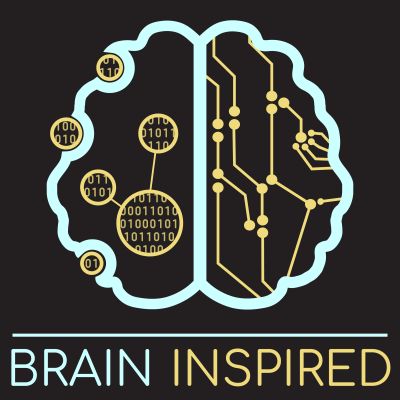Neuroscience and artificial intelligence work better together. Brain inspired is a celebration and exploration of the ideas driving our progress to understand intelligence. I interview experts about their work at the interface of neuroscience, artificial intelligence, cognitive science, philosophy, psychology, and more: the symbiosis of these overlapping fields, how they inform each other, where they differ, what the past brought us, and what the future brings. Topics include computational neuroscience, supervised machine learning, unsupervised learning, reinforcement learning, deep learning, convolutional and recurrent neural networks, decision-making science, AI agents, backpropagation, credit assignment, neuroengineering, neuromorphics, emergence, philosophy of mind, consciousness, general AI, spiking neural networks, data science, and a lot more. The podcast is not produced for a general audience. Instead, it aims to educate, challenge, inspire, and hopefully entertain those interested in learning more about neuroscience and AI.
https://braininspired.co/series/brain-inspired/
BI 092 Russ Poldrack: Cognitive Ontologies
Russ and I discuss cognitive ontologies - the "parts" of the mind and their relations - as an ongoing dilemma of how to map onto each other what we know about brains and what we know about minds. We talk about whether we have the right ontology now, how he uses both top-down and data-driven approaches to analyze and refine current ontologies, and how all this has affected his own thinking about minds. We also discuss some of the current meta-science issues and challenges in neuroscience and AI, and Russ answers guest questions from Kendrick Kay and David Poeppel.
- Russ’s website.
- Poldrack Lab.
- Stanford Center For Reproducible Neuroscience.
- Twitter: @russpoldrack.
- Book:
- The New Mind Readers: What Neuroimaging Can and Cannot Reveal about Our Thoughts.
- The papers we discuss or mention:
- Atlases of cognition with large-scale human brain mapping.
- Mapping Mental Function to Brain Structure: How Can Cognitive Neuroimaging Succeed?
- From Brain Maps to Cognitive Ontologies: Informatics and the Search for Mental Structure.
- Uncovering the structure of self-regulation through data-driven ontology discovery
- Talks:
- Reproducibility: NeuroHackademy: Russell Poldrack - Reproducibility in fMRI: What is the problem?
- Cognitive Ontology: Cognitive Ontologies, from Top to Bottom
- A good series of talks about cognitive ontologies: Online Seminar Series: Problem of Cognitive Ontology.
Some take-home points:
- Our folk psychological cognitive ontology hasn't changed much since early Greek Philosophy, and especially since William James wrote about attention, consciousness, and so on.
- Using encoding models, we can predict brain responses pretty well based on what task a subject is performing or what "cognitive function" a subject is engaging, at least to a course approximation.
- Using a data-driven approach has potential to help determine mental structure, but important human decisions must still be made regarding how exactly to divide up the various "parts" of the mind.
Time points 0:00 - Introduction 5:59 - Meta-science issues 19:00 - Kendrick Kay question 23:00 - State of the field 30:06 - fMRI for understanding minds 35:13 - Computational mind 42:10 - Cognitive ontology 45:17 - Cognitive Atlas 52:05 - David Poeppel question 57:00 - Does ontology matter? 59:18 - Data-driven ontology 1:12:29 - Dynamical systems approach 1:16:25 - György Buzsáki's inside-out approach 1:22:26 - Ontology for AI 1:27:39 - Deep learning hype
